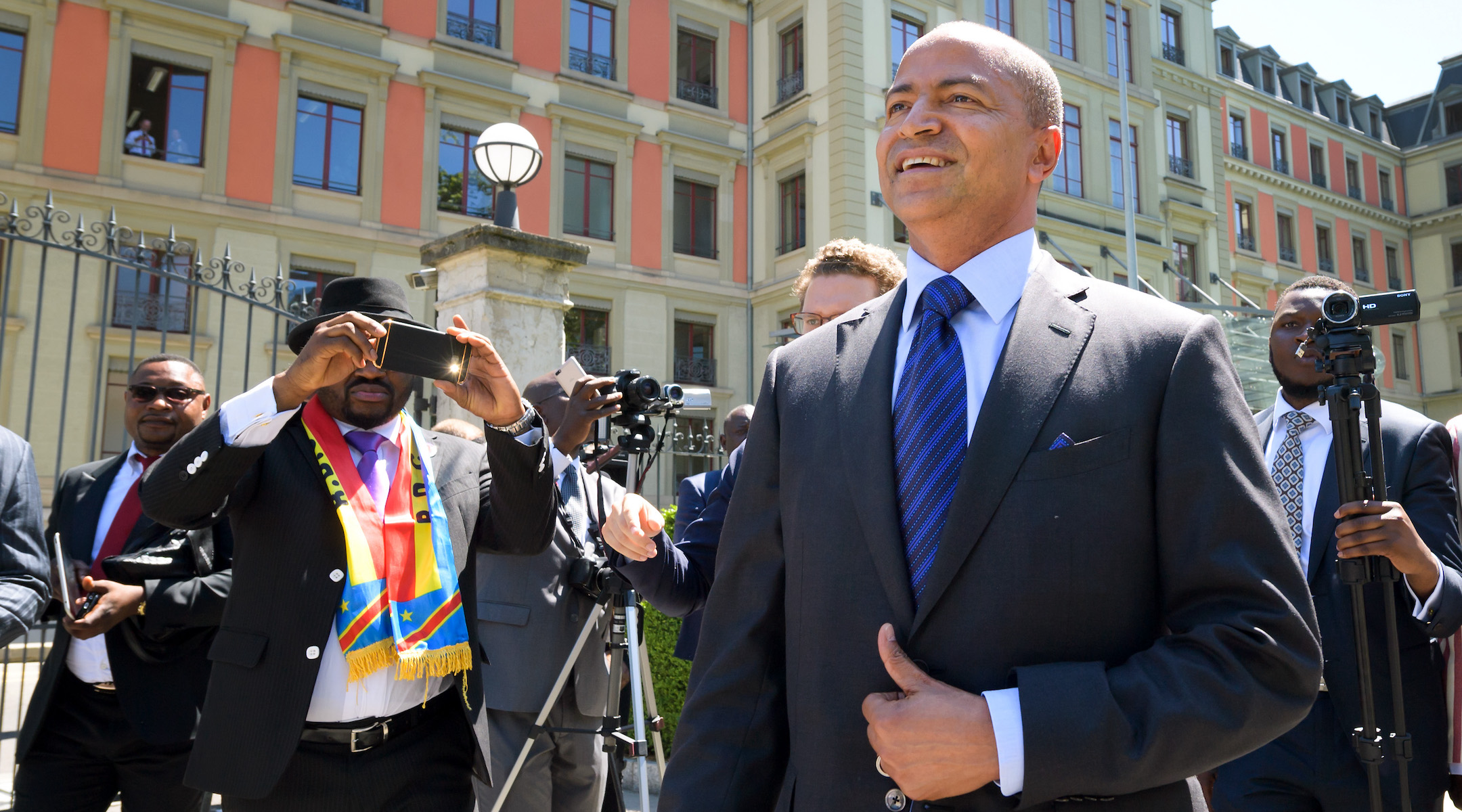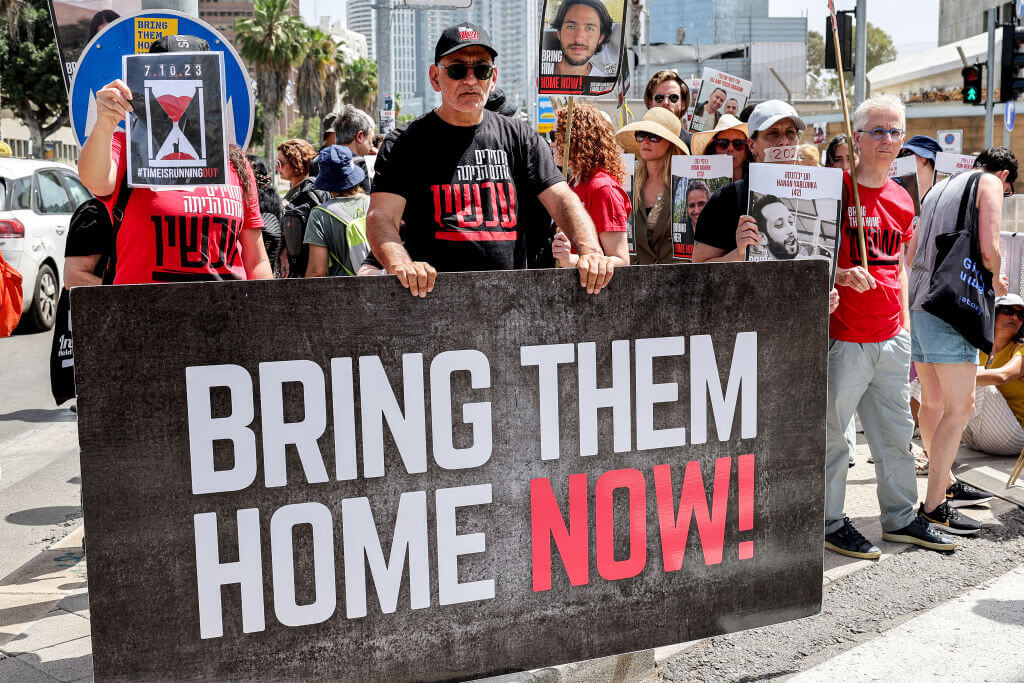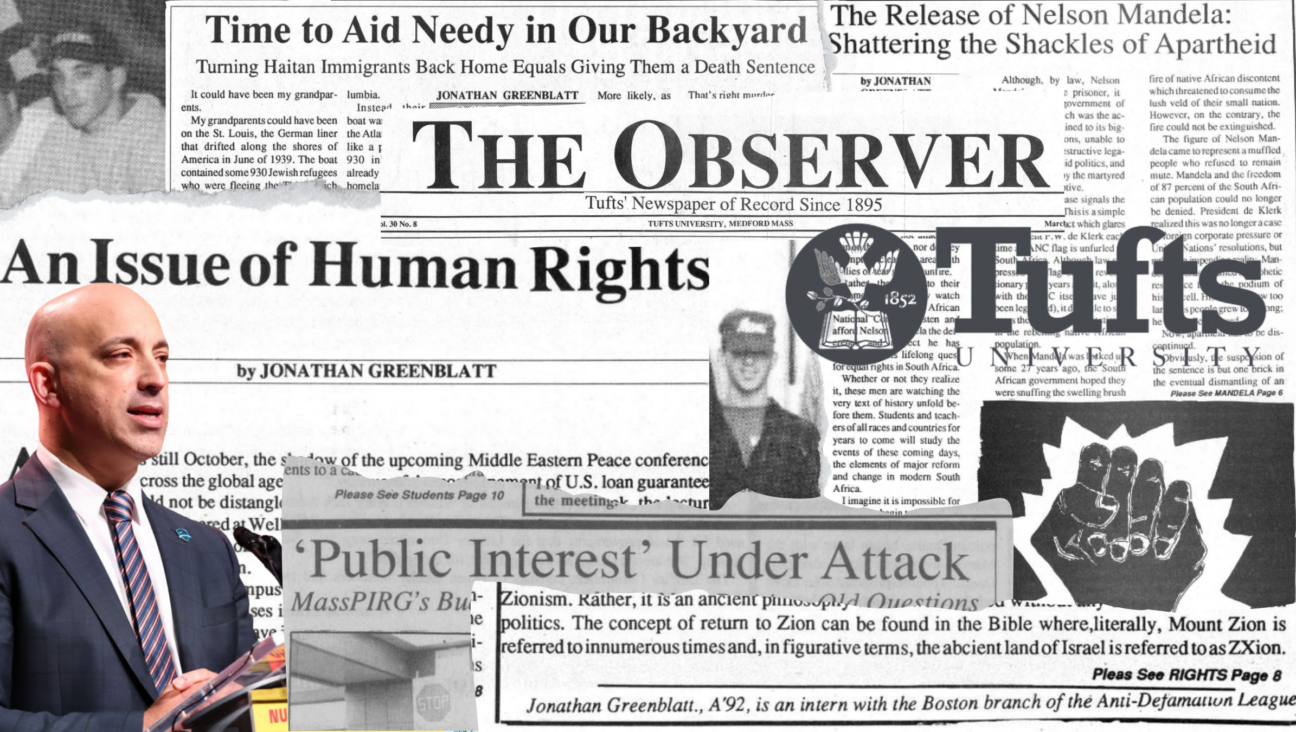Law that would bar Congo’s only Jewish politician from presidency is under consideration again

Moise Katumbi leaves the Palais Wilson in Geneva, Switzerland, June 2, 2017. (Fabrice Coffrini/AFP via Getty Images)
(JTA) — Backers of a law that would bar the Democratic Republic of Congo’s only Jewish politician from becoming president are trying again to get it passed, in a move decried by Jewish leaders abroad.
The law, reintroduced to the African nation’s parliament in Kinshasa last week, would bar anyone without two Congolese parents from ascending to the presidency.
Its main effect would be to block Moise Katumbi from succeeding in his presidential bid underway now. Katumbi is the son of a Congolese woman from a local royal family and a Greek Jew, Nisim Soriano, who fled to what was then a Belgian colony during the Holocaust.
“The controversial bill on nationality has been considered by the opposition as a means of blocking the way for Moise Katumbi, the leading candidate in the 2023 presidential election and who is considered to have the best chance of defeating the incumbent president,” a spokesman for Katumbi told the Jewish Telegraphic Agency.
It’s not the first time Katumbi has come up against the bill, known as the Tshiani Law, after its proponent Noel Tshiani, a rival politician. Tshiani introduced a similar bill in 2021, when Katumbi was also running, citing concerns about foreign meddling in the country’s elections.
“Any mercenary could no longer slip to the top of the Congolese state,” Tshiani said in defense of his bill. On Twitter, he likened the legislation to a biblical command, specifically that in Deuteronomy 17:15, which states, “You may not put a foreigner over you who is not your brother.”
Katumbi has lived all his life in the DRC and on his mother’s side is the great-grandson of a king of the local Lunda ethnic group.
He owns a range of companies in the mining, transportation and food-production sectors and is one of the richest men in the country. In 2016, the Economist called him “the second most powerful man in the Democratic Republic of Congo” after its then-president, Joseph Kabila.
As governor of the DRC’s southern Katanga province, he was wildly popular, increasing revenue in the region tenfold during his rule from 2007 to 2015 and overseeing similar jumps in access to water infrastructure and literacy rates.
Over the course of both his business and political career, Katumbi has maintained close ties with Israel, where his father ultimately moved. Katumbi visited the country frequently while his father was still alive and was once even suggested as a potential buyer of an Israeli soccer team, Maccabi Netanya. Katumbi already owns the DRC’s TP Mazembe team.
The bill has been criticized by those in and outside of the country, with human rights organizations calling it unconstitutional, fearing that it could reignite violence in the recently war-torn state. Elections are set for December, though the current president, Felix Tshisekedi, has warned that
“I am appalled by the proposed legislation that would disqualify a leading candidate from running for office based solely on their Jewish heritage.” said Rabbi Menachem Margolin, Chairman of the European Jewish Association, who has a close relationship with Katumbi.
“This is an egregious violation of human rights and a dangerous step backward for the Democratic Republic of Congo,” Margolin said. “I am sure Congolese citizens will fight against this unjust bill and ensure that all people are able to participate in the electoral process regardless of their background. I call on all who believe in justice and equality to unite in this crucial fight for the future of the DRC and the African continent as a whole.”
This article originally appeared on JTA.org.

I hope you appreciated this article. Before you go, I’d like to ask you to please support the Forward’s award-winning journalism this Passover.
In this age of misinformation, our work is needed like never before. We report on the news that matters most to American Jews, driven by truth, not ideology.
At a time when newsrooms are closing or cutting back, the Forward has removed its paywall. That means for the first time in our 126-year history, Forward journalism is free to everyone, everywhere. With an ongoing war, rising antisemitism, and a flood of disinformation that may affect the upcoming election, we believe that free and open access to Jewish journalism is imperative.
Readers like you make it all possible. Right now, we’re in the middle of our Passover Pledge Drive and we still need 300 people to step up and make a gift to sustain our trustworthy, independent journalism.
Make a gift of any size and become a Forward member today. You’ll support our mission to tell the American Jewish story fully and fairly.
— Rachel Fishman Feddersen, Publisher and CEO
Join our mission to tell the Jewish story fully and fairly.
Only 300 more gifts needed by April 30























